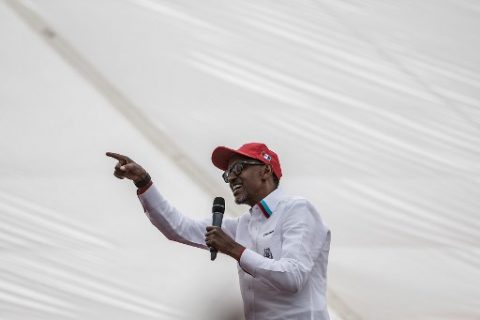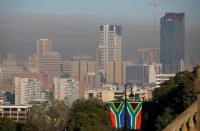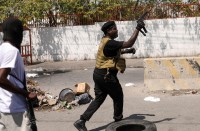
by Stephanie Aglietti
Agence France Presse
KIGALI, Rwanda (AFP) — Rwandans began voting Friday in a presidential election widely expected to return strongman Paul Kagame to office for a third term at the helm of the small east African nation.
Across the country dubbed “the Land of a Thousand Hills,” voters trooped to polling stations covered in the blue, yellow and green colours of the national flag to cast their ballots in the third election since the end of the 1994 genocide.
Some 6.9 million Rwandans have registered to vote in the poll which pits Kagame, 59, against two little-known candidates seen as unlikely to pose any threat to his Rwandan Patriotic Front’s (RPF) tight control of the country.
At a school in the capital, several Rwandans praised Kagame for his leadership since his rebel army routed extremist Hutu forces who slaughtered an estimated 800,000 people — mainly minority Tutsis — and seized Kigali.
“We don’t lack anything with him (Kagame),” said farmer Marie-Rose Nyiraguro, 53.
She said she “doesn’t even know the names” of the two other candidates, Frank Habineza of the Democratic Green Party — the only permitted critical opposition party — and independent candidate Philippe Mpayimana.
Another farmer, Claudine Uzamukunda, 34, waited in line with her baby on her back. “Voting is a duty,” she told AFP. “I came early so I can get back to my daily tasks.”
Kagame was just 36 when he became the de-facto leader of the country after the genocide. He was appointed as president by lawmakers in 2000.
The lanky former guerilla fighter was first elected to the post in 2003 and again in 2010 with more than 90 percent of votes.
His close friend former British prime minister Tony Blair hails him as a “visionary leader” while others see him as a shining example of post-colonial leadership in Africa.
Kagame is credited with a remarkable turnaround in the shattered nation, which boasts an annual economic growth of about seven percent, is safe, clean and does not tolerate corruption.
‘A coronation’
However, critics increasingly bemoan what they see as despotic tendencies. Rights groups accuse Kagame of ruling through fear, relying on a systematic repression of the opposition, free speech and the media.
Kagame’s critics have ended up jailed, forced into exile or assassinated. Few Rwandans would dare to openly speak against him.
Habineza and Mpayimana complained that they were only allowed one week to fundraise, and three weeks to campaign before the election.
“There is no election in Rwanda, there is a coronation declaring Kagame the king,” outspoken local journalist Robert Mugabe told AFP.
Even Kagame has said the result is a foregone conclusion.
“The election is over,” he declared on the first day of the campaign.
His confidence comes after 98 percent of Rwandans approved a constitutional amendment in a 2015 referendum that granted him the right to run for a third term in office.
Observers condemned the reform, which could potentially see Kagame retain office twice more if re-elected this time and allow him to stay president until 2034.
Political analyst Christopher Kayumba said Kagame remains popular with Rwandans, who see him as a guarantor of stability after his military victory brought an end to the genocide.
“Security remains critically important because today we still have people who lived their entire life in war. We only recently had a sustained period of peace,” said Kayumba.
“There is no way you can compare the stature of President Kagame, the resources of the RPF, with the Green Party. The opposition will be beaten hands down. There is no question about that.”
Polling closes at 1300 GMT.
© Agence France-Presse








